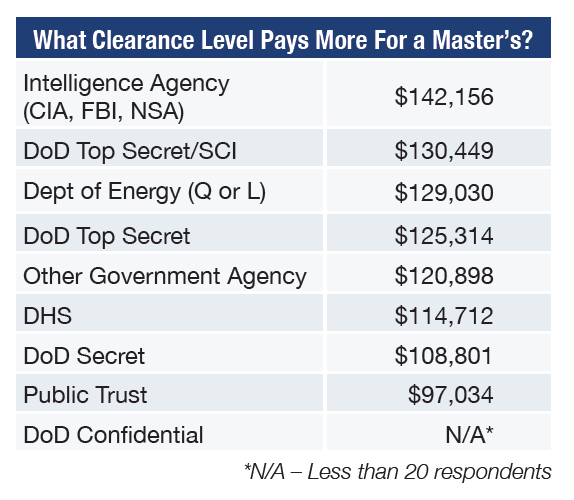The decision to pursue a higher education is often a highly personal one – based on opportunity, family obligations, and career path interests. While the past two years have ushered in a major wave of interest in opening up career opportunities based on skills over paper credentials, the results of the 2021 ClearanceJobs Compensation Report showed that when it comes to salary, a degree is still a significant path to higher pay.
Respondents with a high school diploma only earned average compensation of $77,884, respondents with a bachelor’s degree earned average compensation of $101,921, and those who added to their education with a master’s degree earned average compensation of $123,101.
When it comes to compensation, pay and clearance level are also highly correlated. The higher the clearance level, the higher the compensation. The intel agencies by far offer the highest compensation for security clearance holders, and particularly those who choose to pursue a master’s degree. A bachelor’s degree is frequently considered the baseline requirement, with master’s degrees or advanced degrees signaling particular emphasis and skills development in a certain area. In contrast to bachelor’s degrees, which are touted as creating a well-rounded education, graduate degrees are intentionally focused. If your national security career is focused on Chinese financial markets or a nuance of data science, the benefits of a graduate degree are clear – and employers are willing to pay.
The Cleared Advantage
While a master’s degree is clearly a benefit in the national security workforce, it’s not the only path to a well-paying career. Having a high school diploma and a security clearance still means higher overall compensation than an uncleared professional. While only 4% of respondents in the 2021 ClearanceJobs Compensation Report held only a high school diploma, those who coupled a high school degree with experience were able to increase their earning potential. A high school diploma and less than two years of experience meant just $56,623 in average compensation. Add ten years or more of experience, and compensation jumped to $88,680.
The Secret Sauce: Degrees and Experience
The benefit of pursuing higher education today is that a growing number of employers are more than willing to help pay to pursue more education or certifications while you hold your day job. If you can balance the complexity of life, work, and school, getting an advanced degree while you keep your day job may be the way to go. When considering the benefits of a higher education, keep in mind your field, as well. Finance and engineering professionals saw the biggest salary bump for their trouble.
Read the full results and learn more about the affect of education on earning potential.





